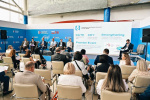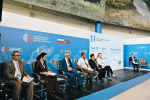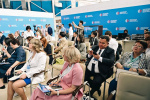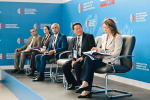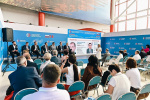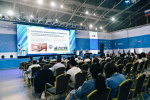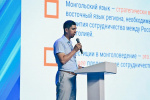08July2025
Education as a Factor of Sustainable Cooperation Between Russia and Mongolia
From July 4 to 6, the First Forum of University Rectors of Russia and Mongolia was successfully held in Ulan-Ude. This international meeting of the academic and scientific communities of the two countries addressed various pressing issues concerning future collaboration in higher education, science, and technology.
The forum was attended by 21 rectors from Russia and 9 from Mongolia. The thematic sessions served as a platform for presentations by the rectors of universities from both countries, as well as vice-rectors overseeing international cooperation at their institutions. One of the keynote speakers was Evgeny E. Vlasov, Vice-Rector for International Relations at the Far Eastern Federal University (FEFU), who delivered a report titled "The Role of Universities in Developing Human Capital for the National Economy." In his speech, he emphasized that FEFU, as the largest classical university in the Far East, effectively fulfills its core mission—advancing intellectual dialogue with Asian nations. Vlasov stated: "The university offers Russian and international students educational programs across a wide range of disciplines, with a particular focus on training engineers, IT specialists, experts in life sciences and biotechnology, and, of course, on developing language education." FEFU is interested in joint engineering programs with Mongolian universities, as Mongolia's rapid economic growth demands more qualified specialists in fields such as geology, metallurgy, and mining. The university also houses the Far Eastern Artificial Intelligence Center, a flagship project.
Tatyana S. Krupnaya, Dean for International Students and Foreign Relations at Irkutsk State Medical University (ISMU), presented a report titled "ISMU’s Experience in Cooperation with Mongolia in Medical Education," highlighting key milestones in healthcare collaboration. A notable historical fact is that the first Mongolian graduate of ISMU, Dashiin Serzhmyadag (1922–1927), worked as a maternal and child health doctor in Ulaanbaatar and later headed a medical station in the South Gobi Province, making significant contributions to nursing education. Over the years, ISMU’s cooperation with Mongolia has been highly productive. In 1986, there were over 100 Mongolian students at ISMU, and in the 1990s, state scholarships were introduced, enabling Mongolians to pursue residency and postgraduate studies. The results were swift: in 1996, the first Mongolian postgraduate student, A. Gurbadam, defended his dissertation under the supervision of Professor A.A. Mayboroda. In 2002, the rector of MNUMS, Professor Ts. Lkhagvasuren, earned his doctoral degree under the guidance of Professor S.B. Pinsky. The effectiveness of academic mentorship is evident in the numbers: from 2002 to 2025, 15 Mongolian specialists defended their candidate and doctoral dissertations in various medical fields under ISMU professors. Among ISMU’s distinguished Mongolian alumni are two Ministers of Health: Tuyaa Danzandarjaa, a pharmacy graduate and Honorary Professor of ISMU, who led the country’s healthcare system, and Sonin Sodov, also an ISMU graduate and former Mongolian Health Minister. Outstanding Mongolian alumni actively support the ISMU Alumni Association.
The session on current issues of sustainable Russia-Mongolia cooperation in education featured presentations by:
-
Yuri A. Trofimov, Rector of Irkutsk State Transport University;
-
Oleg O. Martynenko, Rector of Transbaikal State University;
-
Dashjaa Zorigt, Rector of Ulaanbaatar "Ider" University;
-
Galsan-Yondoniin Sukhbat, Vice-Rector for Research at "Avarga" University;
-
Danaa Ganbat, Director of the Institute of Open Education at Mongolian University of Science and Technology;
-
M.O. Rekets, Vice-Rector for International Affairs at Patrice Lumumba RUDN University;
-
D.A. Shtykhno, Vice-Rector at Plekhanov Russian University of Economics;
-
A.V. Sereda, Vice-Rector for International Cooperation at the State University of Land Management;
and others.
Participants emphasized the strategic importance of developing and implementing joint educational programs with Mongolian universities in priority fields, the need for mutual access to university information resources, and the significance of fostering bilateral youth cooperation between Russian and Mongolian educational institutions. Following the discussions, proposals included:
-
Introducing an interdisciplinary linguistic and regional studies module into Russian and Mongolian university programs to enhance training quality and professional competencies in history, culture, linguistics, law, economics, and other fields;
-
Organizing joint internships for students from Russian and Mongolian universities as part of networked educational programs;
-
Engaging leading scientists, professors, and specialists in implementing joint (networked) educational programs between Russian and Mongolian universities.
The forum underscored the pivotal role of education in strengthening bilateral ties and fostering long-term collaboration.
